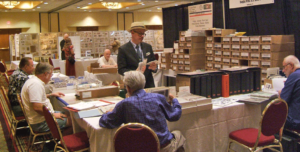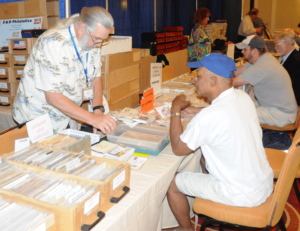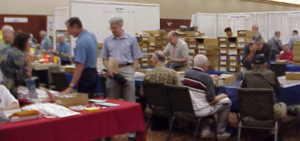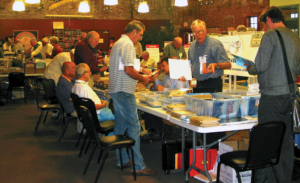Dealing With Dealers
By John M. Hotchner
Dealers can be a convenient target: prices, attitudes, grading practices, stock, response times to phone calls, letters, emails, etc. – all can be critiqued, and often are. As a group,  they are the opposite of the U.S. Congress, where everyone hates the institution, but the great majority like their Congress-person. (How else do we explain the incredibly high re-election rate?)
they are the opposite of the U.S. Congress, where everyone hates the institution, but the great majority like their Congress-person. (How else do we explain the incredibly high re-election rate?)
But stamp dealers? We all, I think, respect the dealer community and understand its value to the collector, but we can all come up with a story or two about dealer practices that are real head-shakers.
But is this fair? I’m certain that dealers can come up with an equal or greater number of stories about customers! And while I don’t doubt the veracity on either side of the dealer table, the stories apply to the minority of both classes.
Thus, my appeal is that we enjoy the stories but not let them taint our own relationships with dealers, singly or as a group. In my experience the great majority are good and competent people who are trying to do the right thing, while making an honest buck to support themselves and their families.
 But enough of this. What I started to write about is the question of how you can help dealers to help you. And after a lot of years of experience, I want to pass along the lessons I have learned. It is all pretty straight-forward, and it is based in good communication, and the fact that each group has something that the other wants.
But enough of this. What I started to write about is the question of how you can help dealers to help you. And after a lot of years of experience, I want to pass along the lessons I have learned. It is all pretty straight-forward, and it is based in good communication, and the fact that each group has something that the other wants.
Yes, partly it is money being traded for material, but there is much more in the equation. Let me list a few of the wants/needs for each class from the other:
Customers: Stamps, Covers and other Philatelic Material to meet our needs, at reasonable prices, a willingness to negotiate, respect, a degree of cheerfulness (or maybe “positiveness” is a better term), information, a willingness to be reasonable, and last but certainly not least, recommendations as to where we might find material we want that the dealer does not carry.
Dealers: Money, respect, a degree of cheerfulness, information, a willingness to be reasonable, and last but certainly not least, recommendations to collectors of your acquaintance.
 If you see a certain similarity between what the two groups want, that is entirely intentional. The basis of any relationship is mutual respect, a positive atmosphere in which to do business, willingness to share information, and helping each other to be successful.
If you see a certain similarity between what the two groups want, that is entirely intentional. The basis of any relationship is mutual respect, a positive atmosphere in which to do business, willingness to share information, and helping each other to be successful.
If I may put this into one thought, it is that my most successful relationships with dealers are ones that are not adversarial. We start from a base of trust, mutual respect, and an expectation for fair dealing on both sides.
All of this applies regardless of the means of contact, but let us focus in on the dealer at a bourse or exhibition. Since this is mostly for my fellow collectors, here are ten things I have tried to do to contribute to a good relationship.
- When I approach a dealer, I know what I am after, and convey my wants clearly. In some cases that may be general, as in “20th century U.S. covers.” Or it may be
 specific, as in “1938 Presidential color varieties” and “Korean War postal history.” This tells the dealer where to direct my attention, and allows him or her to dig into stock for material not yet filed that may be of interest.
specific, as in “1938 Presidential color varieties” and “Korean War postal history.” This tells the dealer where to direct my attention, and allows him or her to dig into stock for material not yet filed that may be of interest. - If I find some material of interest at good prices, I may well branch out into other areas of displayed stock without bothering the dealer; but depending upon how busy the dealer is, I might also ask for secondary interests.
- If I find an item that seems puzzling, I will ask about it if the dealer is not swamped with customers: “I have not seen this marking before … Do you know what it means?” Most dealers are happy to have an opportunity to show off what they know. Likewise, if a dealer asks me why I am buying something that puzzles him, I am more than happy to explain why and the philatelic significance of the item. Sometimes this may seem like idle chatter, but it educates the dealer about your wants.
- If the dealer says that there may be material in stock at home, or back in the store that may be of interest, I am happy to provide a card noted with my wants and my contact points. This often enough results in sales by mail or the Internet, and the opportunity to check out a dealer’s website.
- Having selected material I want to purchase, I often ask the dealer what he or she
 needs for it. Yes, there is a marked price, and if it is a small purchase, it is understood that I am expected to pay it. But with larger purchases, dealers usually expect to be asked for a discount, but it cannot be demanded. There is no automatic discount, unless discounts according to purchase level are posted. But most dealers will come down a bit on price on larger purchases if asked. They want you as a long-term customer, and this is one way to help that to happen.
needs for it. Yes, there is a marked price, and if it is a small purchase, it is understood that I am expected to pay it. But with larger purchases, dealers usually expect to be asked for a discount, but it cannot be demanded. There is no automatic discount, unless discounts according to purchase level are posted. But most dealers will come down a bit on price on larger purchases if asked. They want you as a long-term customer, and this is one way to help that to happen. - If a dealer goes to the trouble of finding additional material in my areas that I can use, I will often buy it if the price is reasonable, even if I don’t have an immediate need for the item. Why? Because I want to encourage the dealer to keep looking. The next item(s) s/he comes up with may be a long-sought want, and it has happened many times.
- My checkbook is not bottomless. If I find something that I want but can’t afford all at once, I offer a payment schedule; usually a down-payment and the rest in 30 days, or in 30-day increments. If accepted I pay on time, or early if possible.
- I keep the names of dealers from whom I have bought specific types of material, and if I expect to see them at another show or bourse (dealers in attendance are usually shown on the website of the sponsoring organization), I will write to them ahead of time and ask them to bring whatever from their stock that I am looking for at the time. Often enough, dealers who know my wants will do this without being asked, but it is still a courtesy for you to let them know you will be there.
- In going through a dealer’s stock, if I find material that I know others are looking for, I will often ask if so-and-so has seen this. If not and they are at the show, I may borrow the item and go find the collector to show it to them. Or I may ask the dealer to put it aside, and suggest to the collector that they stop by and review it. If the collector is not at the show, taking a photo of the item and sending it to them by email may well turn into a sale. Not only do you help a friend, but you help the dealer. By the same token, I am not hesitant to ask a dealer who else on the floor carries the material I am looking for, and have gotten useful referrals.
- However obvious it may be, politeness counts. There is usually only one dealer and often many customers. Waiting your turn is the right thing to do when the dealer is occupied making a sale or digging for material for another collector. My time is no more important than the dealer’s.
I’m certain that many readers of this column will have developed their own methods of dealing with dealers. If so, your thoughts on this column, and additional ideas would be welcome. Please post them here or write to me at PO Box 1125, Falls Church, VA 22041-0125, or by email at email, putting “VSC” in the subject line.




Great pointers and comments from a retired dealer.
It is good advice. There is much to access from dealers. Collectors and dealers should look to build relationships and trust. That said, sometimes the simplest transactions are best. Dealers love to know your interests, but they are unlikely to go the extra mile unless you show a willingness to look beyond the immediate, and they get to know you as a customer.
Excellent account and summary. My experiences with dealers at shows are probably about 98% positive – but it is the bad ones that are most remembered. My wife once asked if I wanted to become a stamp dealer. My reply was that it was very challenging and time consuming work – too hard for me to even contemplate. So, I have enormous respect for the efforts – probably frequently unthanked (if that’s a word) by customers – that dealers have in organizing, traveling, not to mention trying to make their business profitable. Thinking about doing a show from start to finish in a dealer’s shoes is absolutely exhausting.
Obviously someone is buying stamps from the dealers I see at shows, but not me. After years of attempting to acquire stamps through such dealers and never having a good experience, I switched to online auctions. I found I always got much better quality stamps at lower prices online. I don’t have thousands of dollars to spend on stamps; perhaps if I did, I would get a dealer’s attention. But if you are interested in stamps selling for less than $100, online is the only way to go.